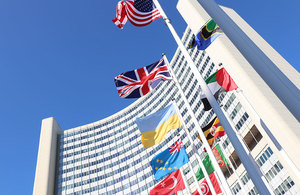UK Statement on Dark & Quiet Skies at the 59th session of the Scientific and Technical Subcommittee of COPUOS
Delivered by Tamojen Morgan, Beyond Earth Orbit Lead, UK Space Agency, 15 February 2022

Chair, Distinguished Delegates,
The Delegation of the United Kingdom is pleased to have the opportunity to share with you our views on the issues raised by the International Astronomical Union (IAU) regarding the impact that satellite constellations in Low Earth Orbit have on their work, and the progress we have made since the last meeting of this sub-committee to address these concerns.
The United Kingdom understands and sympathises with the IAU’s position regarding the impact that satellite trails in Low Earth Orbit (LEO), radio-wavelength emissions and artificial light at night (ALAN) have on their work.
We fully recognise the importance of these issues and the role those astronomical observations, from space and Earth-based installations, play in our ability to understand our Universe, enable deep space navigation and exploration, and provide early warning detection of Near-Earth Objects.
The United Kingdom has a world leading astronomical community, supported by the Royal Astronomical Society (RAS). We have routinely taken a key role in many of the most exciting astronomical discoveries over the past decade, including understanding the expansion of the Universe, the search for other Earth-like planets and the detection of gravitational waves.
We have committed £271 million to assist in the construction of the Square Kilometre Array Observatory in Africa and Australia, but who has its headquarters in the United Kingdom, we pay £27 million per annum to the European Southern Observatory and are a key partner in the Vera Rubin Observatory and the Extremely Large Telescope both under construction in Chile.
We recognise that we have a duty to continue to support our astronomical community as we grow our presence, and investment, in the space sector and deliver the ambitions set out in our National Space Strategy to be one of the most attractive countries for space-sector businesses; creating a national space ecosystem spreading employment across the United Kingdom, boosting exports, attracting talent and investment, and further integrating space data and technologies into our daily lives.
As we grow our presence, in the space sector, we recognise that there will need to be trade-offs between the needs of the astronomical community and the needs of orbital operators and vice versa. At the 58th session of this subcommittee, we highlighted the importance of this in our national statement and do so again today.
Since the 58th session, the United Kingdom has actively engaged with both orbital operators and the astronomical community, including the Royal Astronomical Society and the European Astronomical Society, on the matters raised by the IAU and have carefully considered the viewpoints of our fellow delegates.
We have carefully considered the recommendations made by the IAU, in their Dark and Quiet Skies II for Science and Society Working Group Reports, have taken great interest in the work they have done to coordinate and deliver a Conference Room Paper for this subcommittee to consider and commend them for their efforts in highlighting these issues.
The United Kingdom is committed to working with both orbital operators and the astronomical community to reduce and, where possible, resolve the issues identified. At a national level, we have established a cross-Government, cross-community working group to define the full extent of the issues relating to the impacts of optical/infrared trails from satellites and the impacts of radio transmissions and are seeking to define and develop both national and international mitigatory options for these issues going forward.
At an international level, we are supportive of adopting a temporary one-year agenda item to allow this subcommittee time to discuss the impact of satellite trails in LEO and are happy to make the findings from our own domestic working group available to help facilitate this. However, we strongly believe that discussions surrounding radio-wavelength emissions should be referred to the International Telecommunications Union (ITU) for consideration and that this subcommittee should avoid extending its remit to cover the issues identified relating to ALAN, instead we believe this would be best discussed at a national level.
In short, the United Kingdom believes by adopting these approaches we are sending a clear message that this matter is worth discussing and addressing but are also suitably balancing the needs of both orbital operators and the astronomical community so that space can remain sustainable for all going forward.